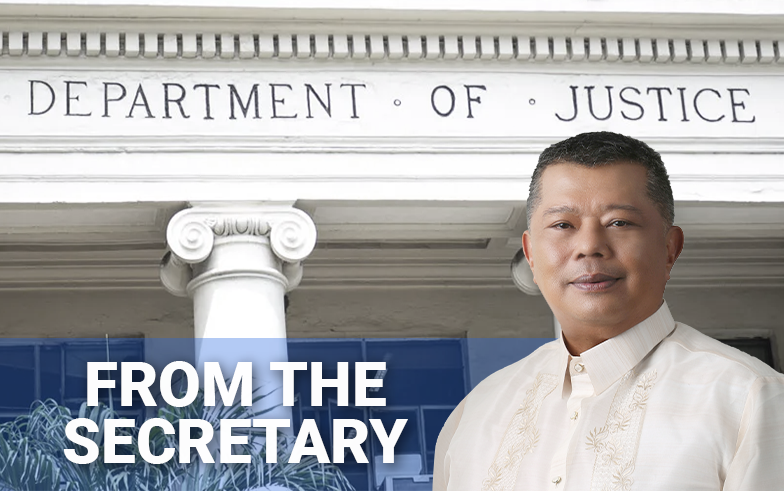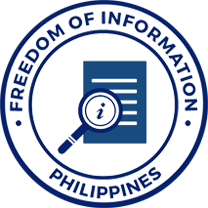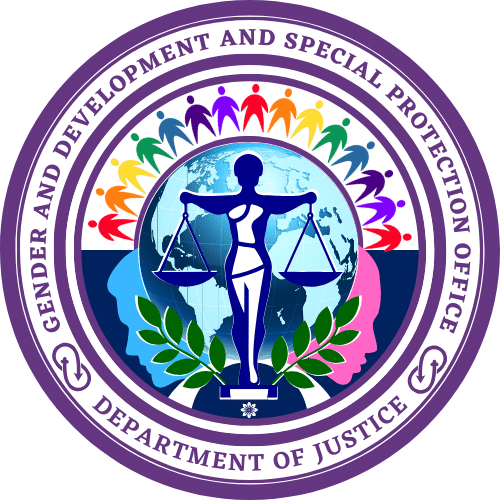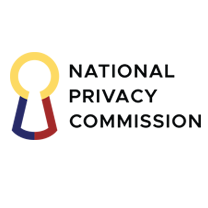Vision
A just and peaceful society anchored on the principles of transparency, accountability, fairness and truth.
Mission
Effective, efficient and equitable administration of justice.
Mandate
The Department of Justice (DOJ) derives its mandate primarily from the Administrative Code of 1987 (Executive Order No. 292). It carries out this mandate through the Department Proper and the Department's attached agencies under the direct control and supervision of the Secretary of Justice.
Under Executive Order (EO) 292, the DOJ is the government's principal law agency. As such, the DOJ serves as the government's prosecution arm and administers the government's criminal justice system by investigating crimes, prosecuting offenders and overseeing the correctional system.
The DOJ, through its offices and constituent/attached agencies, is also the government's legal counsel and representative in litigations and proceedings requiring the services of a lawyer; implements the Philippines' laws on the admission and stay of aliens within its territory; and provides free legal services to indigent and other qualified citizens.
Functions
1. Administration of the Criminal Justice System
The DOJ investigates the commission of crimes and prosecutes offenders through the National Bureau of Investigation (NBI) and the National Prosecution Service (NPS), respectively. Likewise, the DOJ administers the probation and correction system of the country through the Bureau of Corrections (BuCor), the Board of Pardons and Parole (BPP)and the Parole and Probation Administration (PPA).
2. Legal Counsel of Government
The DOJ, through the Office of the Solicitor General (OSG) and the Office of the Government Corporate Counsel (OGCC), acts as the legal representative of the Government of the Philippines, its agencies and instrumentalities including government owned and controlled corporations and their subsidiaries, officials and agents in any proceeding, investigation or matter requiring the services of a lawyer.
EO 292 specifically designates the Secretary as Attorney-General and ex-officio legal adviser of government-owned or controlled corporations (GOCC) and their subsidiaries. The Secretary exercises administrative adjudicatory powers over all controversies between/among government agencies, including government owned and controlled corporations including their subsidiaries. This power of adjudication of the Secretary originally stemmed from Presidential Decree No. 242, and is now embodied in Sections 66 to 71, Chapter 14, Book IV of E.O. 292.
The Secretary is likewise empowered to act on all queries and/or requests for legal advice and guidance from private parties and other officials and employees of the government.
3. Regulation of Immigration
The DOJ provides immigration and naturalization regulatory services and implements the laws governing citizenship and the admission and stay of aliens through the Bureau of Immigration (BI). Also, under Administrative Order No. 142 dated August 23, 1994, the Secretary or his duly-authorized representative is authorized to act on immigration matters, including waiver of visas and admission of aliens, except deportation matters.
Likewise, the DOJ, through the DOJ Refugee Processing Unit (DOJ-RPU), processes applications for refugee status of persons pursuant to the obligations of the Philippines as signatory to the 1951 Convention and 1967 Protocol relating to the Status of Refugees.
4. International Cooperation
The DOJ is the central authority of the Republic of the Philippines relative to extradition and mutual legal assistance treaties (MLAT) on criminal matters and is involved in several aspects of international cooperation such as the drafting and implementation of legislation and agreements as well as the negotiation of extradition and MLAT. Moreover, under Philippine Extradition Law (P.D. 1069), the DOJ handles requests for extradition and/or mutual legal assistance and represents treaty partners in Philippine courts.
The Department is also involved in the negotiation of various investment and trade agreements with other foreign countries. The Secretary is also the ex-officio Co-Vice Chairman of the Commission on Maritime and Ocean Affairs (CMOA) pursuant to EO 612 and EO 612-A (2007), which is involved in the identification of the Philippine baselines and in the preparation of the submission to the United Nations of the country's claim for extended continental shelf.
5. Provision of Free Legal Assistance
The DOJ provides free legal assistance/representation to indigents and poor litigants as well as other qualified persons in criminal, civil, and labor cases, administrative and other quasi-judicial proceedings and non-commercial disputes through the Public Attorney's Office (PAO)pursuant to RA No. 9406.
6. Alternative Dispute Resolution
With regard to conciliation and mediation, the Alternative Dispute Resolution Act of 2004 (RA 9285) created the Office for Alternative Dispute Resolution (OADR), which is an agency attached to the DOJ and which is tasked to promote, develop and expand the use of alternative dispute resolution in civil and commercial disputes.
7. DOJ functions under other laws and other executive issuances:
In addition to performing its mandate under E.O. 292, the Department is significantly involved in the implementation of the following penal, national security, and social welfare laws:
- The Witness Protection, Security and Benefit Act (R.A. 6981), which mandates the DOJ to formulate and implement a Witness Protection, Security and Benefit Program for the admission and protection of witnesses;
- Implementation of the Victims Compensation Program through the Board of Claims created under the DOJ (RA 7309);
- Administrative Order No. 99 (1988), designated DOJ as lead implementor of Justice System Infrastructure Program (JUSIP) that was tasked to construct/rehabilitate decent office buildings for judges, prosecutors, public attorneys, probation officers, and registers of deeds;
- Executive Order 180 (1987), which created the Public Sector Labor Management Council, of which the Secretary is a member, to provide guidelines for the exercise of the right of government employees to organize;
- The Comprehensive Dangerous Drugs Act of 2002 (RA 9165), which created the Dangerous Drugs Boardto see to policy-making and strategy-formulation on drug prevention and control and designated the Secretary or his representative as ex-officio member of such Board;
- The Anti-Money Laundering Act of 2001 (R.A. 9160), which created the Anti-Money Laundering Council (AMLC) to which the DOJ is a support agency through the investigation of money laundering offenses and the prosecution of offenders. With the DOJ Anti-Money Laundering Desk (DOJ-AMLD), the DOJ works in close coordination with the AMLC in its task of combating money laundering and financing of terrorism;
- The Human Security Act of 2007 (RA 9372) which created and designated the Secretary as ex-officio member thereof. Relative to this and under EO 292, the Secretary is also an ex-officio member of the National Security Council (NSC), which advises the President with respect to the integration of domestic, foreign, military, political, economic, social, and educational policies relating to national security;
- The Rape Victim Assistance and Protection Act of 1998 (RA 8505), which mandated the DOJ to participate in inter-agency efforts to establish Rape Crisis Centers in every city or province for the purpose of rendering assistance to rape victims;
- The Anti-Trafficking in Persons Act of 2003 (R.A. 9208), which mandates the prosecution of persons accused of human trafficking and for that purpose, created the Inter-Agency Council on Trafficking (IACAT), of which the Secretary is Chairman;
- The Anti-Violence Against Women and Their Children Act of 2004 (RA 9262), which designated the Department as a member agency of the Inter-Agency Council on Violence Against Women and their Children (IACVAWC), the monitoring body of government initiatives to counter violence against women and children;
- Executive Order 53 (2011) amending EO No. 275 pursuant to the Special Protection of Children Against Abuse, Exploitation, and Discrimination Act (RA 7610), designating the DOJ Secretary as the Chairperson of the Committee for the Special Protection of Children;
- Anti-Child Pornography Act of 2009 (IRR of RA), designating the Secretary of Justice as member of Inter-Agency Council Against Child Pornography that is tasked to coordinate, monitor and oversee the implementation of Anti-Child Pornography Act;
- Cybercrime Prevention Act of 2012 (RA 10175), the Office of Cybercrime within the DOJ designated as the central authority in all matters related to international mutual assistance and extradition;
- Executive Order 45 (2011), which designated the DOJ as competition authority that investigates all cases involving violations of competition laws and prosecute violators to prevent, restrain and punish monopolization, cartels and combinations in restraint of trade;
- Administrative Order 35 (2012), which designated the Secretary of Justice as Chairperson of the Inter-Agency Committee on Extra-Legal Killings, Enforced Disappearances, Torture and Other Grave Violations on the Right to Life, Liberty and Security of Persons, the body that undertakes inventory of cases mentioned perpetrated by state and non-state forces;
- Memorandum Circular No. 68 (2014), creating an Inter-Agency Task Force to Strengthen the Implementation of RA 8049 otherwise known as the Anti-Hazing Law, with the DOJ Secretary as Chairperson.
Other tasks falling within the multifarious duties of the executive branch to administer the laws devolve upon the Department through the Secretary, to wit:
- The Anti-Dummy Law (Commonwealth No. 108), as amended by Presidential Decree 715, whereby the Secretary is empowered to authorize the employment of aliens as technical personnel in the management of a franchise, business or enterprise expressly reserved by law to Filipino citizens or corporations or associations whose equity at least 60% of which is owned by Filipinos;
- The Local Government Code (Section 187 of RA 7160) which vests in the Secretary appellate jurisdiction over the constitutionality or legality of municipal tax ordinances and revenue; measures;
- Executive Order 643 (2007) which vests the DOJ with administrative supervision over the Presidential Commission on Good Government (PCGG).
The Secretary is also an ex-officio member of the Judicial and Bar Council (JBC) [Section 8(1), Article VIII of the 1987 Constitution], the Committee on Privatization [AO 48 (1987)], and the National Water Resources Board (NWRB) (EO 123, series of 2002). He is also an ex-officio director of the Power Sector Assets and Liabilities Management (PSALM)Corporation (RA 9136, otherwise known as Electric Power Industry Reform Act of 2001). Under EO 648, series of 1981, an undersecretary of the DOJ is designated as an ex-officio Commissioner of the Housing and Land Use Regulatory Board (HLURB).








